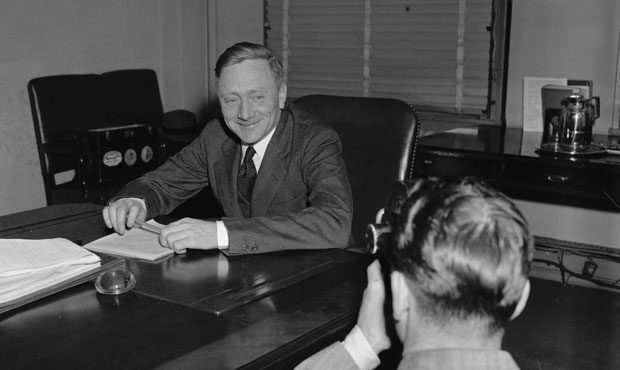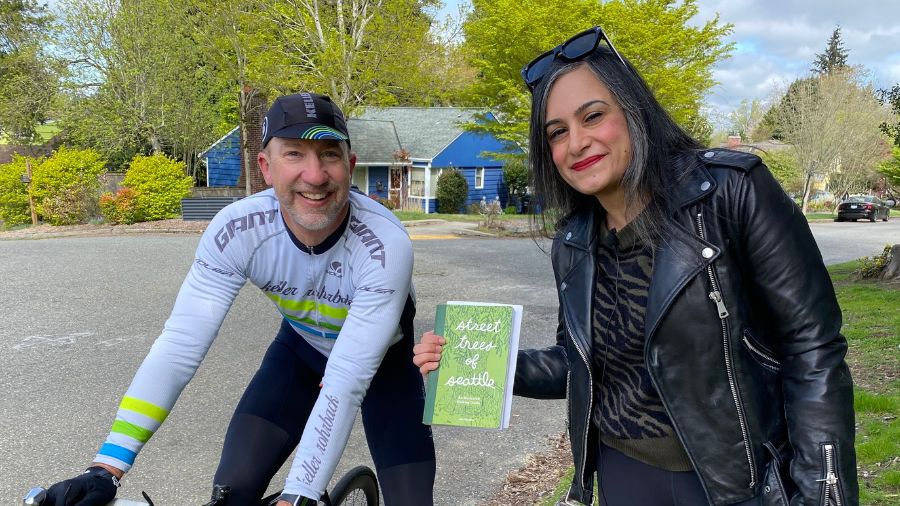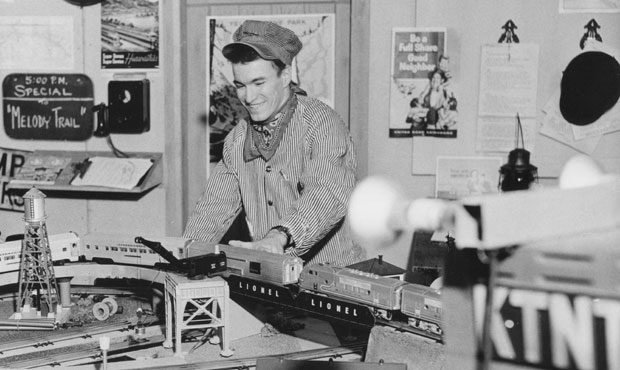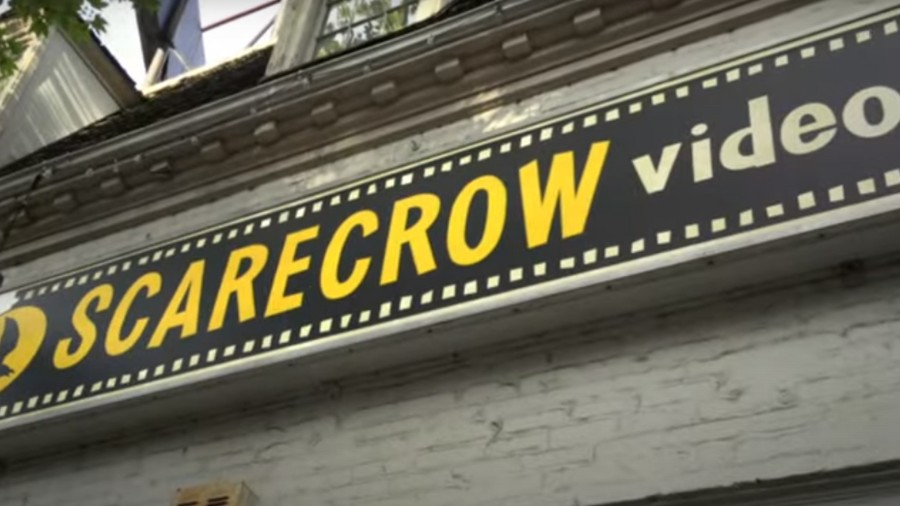‘Wild Bill’ Douglas still Evergreen State’s only US Supreme Court Justice
Sep 30, 2020, 9:51 AM | Updated: 11:24 am

William O. Douglas was the 40-year old Chairman of the Securities and Exchange Commission when President Franklin D. Roosevelt nominated him to the Supreme Court on March 20, 1939 (the day this photo was taken); Douglas grew up in Yakima, WA and spent summers in Yakima County near Goose Prairie for most of his adult life. (Library of Congress)
(Library of Congress)
With the United States Senate weighing the possible confirmation of Amy Coney Barrett as the newest Supreme Court Justice — and the creation of a conservative supermajority on the bench – it seems like a good time to take a look back at William O. Douglas, the only member of the highest court — in its more solidly liberal days — raised right here in the Evergreen State.
Douglas was born in Minnesota in 1898 and moved to Yakima as a young child. He graduated from Whitman College in Walla Walla, and then Columbia University Law School in New York. After serving as a law professor at Yale and becoming acquainted with Franklin D. Roosevelt, FDR put him in charge of the Securities and Exchange Commission to help reform the stock market in the wake of the Great Depression.
In 1939, the Democratic president then appointed Douglas to the Supreme Court seat vacated by Justice Louis Brandeis. At age 40, Douglas was one of the youngest justices ever confirmed.
In the 21st century, Douglas is remembered by many as a liberal icon of the Supreme Court in the 1950s and 1960s, and as an early environmentalist. Douglas was also a complex character with a sometimes tumultuous personal life – he was married four times, on each occasion to an increasingly younger woman – and his outspokenness and other activities outside the court contributed to two failed attempts to impeach him.
Bruce Murphy is a professor at Lafayette College in Easton, Pennsylvania. He spent years doing research and in 2003 published an exhaustive biography called Wild Bill: The Legend and Life of William O. Douglas. “Wild Bill” was one of Douglas’ nicknames, bestowed for the Western cowboy persona he cultivated, as well as for the extremism of some of his liberal views.
As part of his research, Murphy stayed for weeks at the Double K Ranch in Yakima County near Goose Prairie, where Douglas was a habitué, and where Douglas owned a nearby home for many decades. One day, on a long hike, Murphy overheard a father and son hiking duo who had reached the same mountaintop from the opposite side of Murphy’s route.
“The fellow looked at the young boy and said, ‘Did you see those marks on the trees? Those were marks to show which way the trail was going. They were probably put there by William O. Douglas. That’s who these forests are named for,’” Murphy said, illustrating how Douglas’ reputation as an outdoorsman has persisted, in some ways, more than other parts of the jurist’s legacy.
“Douglas is very much a creature of the Northwest,” Murphy continued. “And I think he fancied himself as being a frontier man from Goose Prairie.”
The area where Murphy was hiking was named the William O. Douglas Wilderness in 1984. Douglas had retired from the court in 1975 after suffering a stroke. By the end of his tenure, he was the last living FDR appointee, and he had served more than 36 years, longer than any other justice before or since. William O. Douglas died in 1980 and is buried in Arlington National Cemetery.
The legend of William O. Douglas grew largely from books he wrote, including a few memoirs that many Northwesterners have read – including Of Men and Mountains and Go East, Young Man.
Bruce Murphy read those books, too. Early in his research, he tried to confirm the facts in the stories and anecdotes, but he couldn’t really do it. For instance, Douglas did not have polio as a child, and he didn’t ride the rails like a hobo to get to law school. Those memoirs, Murphy says, should be thought of more as novels.
As an example, Murphy pointed to a Yakima County neighbor of William O. Douglas.
“Jack Nelson, who lived up in Goose Prairie, once was asked, ‘Why don’t you write your memoirs?’” Murphy said. “And he said, ‘I can’t. Douglas has already done that for me, and that’s his life now.’”
As Murphy describes it, Douglas had something of a “truthiness” problem, and it seems that this strange relationship with the truth, along with other difficult issues in Douglas’ personal life, likely stemmed from his upbringing.
Bottom line? Murphy acknowledges that he is not a psychologist, but he says his research taught him that it’s helpful to view Douglas not as a Supreme Court Justice, but instead as a failed presidential candidate. For Douglas, Murphy says, serving nearly four decades on the Supreme Court just wasn’t enough.
“You’re dealing with a very, very talented, very smart, very creative, almost visionary human being who wants to be someone different,” Murphy said. “He maybe wants to be president. He wants to be a charismatic leader. He wants to be a novelist, and he wants to be Walt Whitman.”
“He never really accepted who he was, which was one of the legendary liberals on the Supreme Court and one of the people we should remember,” he added.
Murphy says Douglas was raised by his widowed mother Julia, who convinced her son that the family was poverty stricken and resources were scarce, though she actually owned a lot of real estate. She also raised her son to believe he was destined to become president.
On that last point, Douglas actually came pretty close.
FDR appointed Douglas to the court to eliminate him as a potential rival in the 1940 election, and then considered him seriously for vice president in 1944 — which would’ve meant becoming president when FDR died in April 1945. Then, President Harry Truman – FDR’s ultimate VP pick instead of Douglas, who had assumed the presidency when FDR died — tried to recruit Douglas in 1948 to be his VP.
Murphy says Douglas turned him down because he thought Truman was going to lose to John Dewey.
The late 1940s were pivotal for William O. Douglas. Harry Truman went on to win the 1948 election, meaning Douglas had once again missed a critical opportunity to jump to the Executive Branch. Then, in 1949, he was badly injured in a fall from a horse.
It was in those years that Douglas began writing what would become Of Men and Mountains, putting ink to paper and creating a series of myths about himself, along with anecdotes lifted from classmates and colleagues that now featured Douglas as the protagonist.
Serving on the Supreme Court in this era, Douglas also became the most liberal justice ever, especially after 1960 when a youthful JFK’s arrival made it clear that Douglas had, effectively, aged out of any chance for a White House bid.
Just how liberal was William O. Douglas in those decades? Murphy says there’s a statistical way of measuring that.
“Nowadays the court ranges from a ‘Minus 4’ – [with] liberals being in the ‘minus’ category – to a ‘Plus 4’ – [with] conservatives being in the ‘plus category,’” Murphy said.
Among the current justices, “’Minus 4’ is Sonia Sotomayor, ‘Plus 4’ is Clarence Thomas,” Murphy added.
What about William O. Douglas?
“Douglas was a ‘Minus 7,’” Murphy said. “He was consistently liberal. And when you look at that chart year by year of how liberal he becomes, it’s like it’s going down the ski slope as he’s further and further from the possibility of becoming president.”
Forty years after Douglas passed away, numerous buildings and programs – especially in Eastern Washington – are named in his honor. But unlike Supreme Court legends such as Earl Warren and Thurgood Marshall, Douglas doesn’t seem to be remembered much outside of legal and environmental circles.
Still, Murphy says, Douglas does have a legacy.
“Without William O. Douglas, we would not have our right of personal autonomy privacy — that entire right, all of it,” Murphy said. “Contraception, Planned Parenthood, the right to choose, abortion, same-sex relations, same-sex marriage, the right to die with dignity – all of it – the way you run your life and choices that you make.”
“It all dates back to one case in 1965, Griswold v. Connecticut,” Murphy said. “And it’s William O. Douglas essentially inventing this right, figuring out a way to put it into the Constitution and then defending it for the rest of his career, and launching that right so that Harry Blackmun can then grab it in Roe v. Wade and expand on it further.”
“That’s Douglas’s real legacy,” Murphy said.
And while the stories Douglas wrote may have been made up or “borrowed” from others, his love of the outdoors was genuine, and it’s part of what makes Douglas a true Washingtonian – even if he was, technically, born in the Gopher State.
This love of the outdoors also led to one more legacy that Murphy says Douglas deserves credit for.
“I think the whole environmental legal movement can be traced to Douglas,” Murphy said. “He was very concerned with nature and preserving nature, and trying to prevent corporations from destroying nature. He was the one who said nature and trees and valleys and rivers … should have standing to sue; they are as important as people.”
“The whole Greenpeace and environmental legal movement, that also tracks to Douglas,” he continued. “And I’m not sure people remember that origin either.”
But history has a way of coming in and out like the tide, if sometimes on a decades or longer cycle, and Murphy says the memory and legacies of William O. Douglas aren’t completely lost at sea.
“I do believe that in 20 or 30 years, when you see the Progressives take control of the government and the Green New Deal and all of that,” Murphy said, the frontier man from Goose Prairie will be relevant again.
“They will rediscover Douglas,” Murphy said, “because he has a lot to tell them.”
You can hear Feliks every Wednesday and Friday morning on Seattle’s Morning News and read more from him here. If you have a story idea, please email Feliks here.













